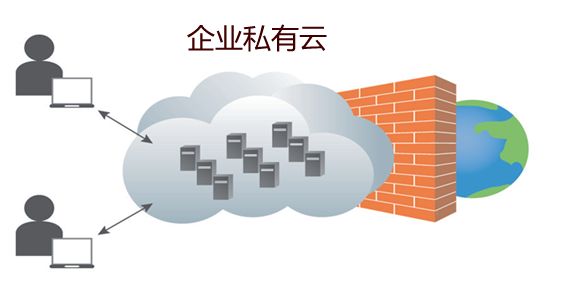What is a private cloud
Private Cloud It is another concept relative to the public cloud. It refers to a special mode of cloud computing. IT services are configured through a dedicated IT infrastructure for the exclusive use of a single organization. Private clouds are usually managed through internal resources. It involves a unique and secure cloud based environment in which only designated clients can run.
Private cloud and Virtual private cloud Generally, they can be used interchangeably. Technically, virtual private cloud is a private cloud that uses the infrastructure of a third-party cloud provider, and private cloud is implemented through the internal infrastructure.
Like other cloud models, the private cloud will use the underlying physical computing resource pool to provide computing power as a service in a virtualized environment. However, in the private cloud mode, the cloud (resource pool) can only be accessed by a single organization, so it can provide greater control and privacy for the organization.

Private cloud is divided into the following three parts:
1. Private cloud platform
The private cloud platform provides users with various private cloud computing services, resources and management systems.
2. Private cloud services
Private cloud services provide cloud services focusing on resources and computing power, including hardware virtualization, centralized management, elastic resource scheduling, etc.
3. Private cloud management platform
The private cloud management platform is responsible for the operation of various services of private cloud computing and the centralized management of various resources.
What are the characteristics and benefits of private cloud?
- Higher security and privacy
Although public cloud services provide a certain degree of security, private cloud is a more secure choice. This is achieved through the use of different resource pools, whose access is restricted from the firewall, dedicated leased lines and on-site internal hosting of an organization
Since private clouds can only be accessed by a single organization, the organization can configure and manage private clouds according to its own needs to achieve customized network solutions
- Cost and energy efficiency
The implementation of the private cloud model can improve the resource allocation within the organization by ensuring the resource availability of each department/business function to respond directly and flexibly to its needs. They use computing resources more effectively than traditional LANs, and can also reduce the organization's carbon footprint
Even if resources (servers, networks, etc.) are hosted internally, creating a virtualized operating environment means that the network is more resilient to a single failure in the entire physical infrastructure. For example, a virtual partition can extract its resources from the remaining unaffected servers
In the case of surging demand, some providers may provide opportunities to use cloud bursts within private cloud products. This service allows the provider to switch some non sensitive functions to the public cloud, thereby freeing more space in the private cloud for sensitive functions that need it
What are the characteristics of a private cloud?
Cloud ring network attack with multiple clients accessing virtualization services. These clients obtain resources from different physical computing pools. These can be hosted internally or externally, and can be accessed through private leased lines or connected through public network security encryption for additional security, which is very suitable for enterprises that need to store and process private data or perform sensitive tasks. For example, private cloud services can be used by financial companies that need to store sensitive data internally and still want to benefit from some of the advantages of cloud computing, such as on-demand resource allocation.
Why use private cloud?
Private cloud is an ideal solution for enterprises that want to provide enterprise resources on demand but cannot (or do not want to) migrate to public cloud. This may be due to security policies, budgets, compliance requirements or regulations, such as those defining the healthcare and financial services industries. Companies in these industries use encryption protocols and firewalls to protect their network systems, but compared with public clouds, private clouds add an additional level of security because access is restricted.
Whether you invest in a private cloud infrastructure also depends on the workload that needs to be supported. Traditional stateful workloads are well supported by enterprise virtualization products. However, stateless, loosely coupled workloads - often found in development, research, and telecommunications (especially network function virtualization) - are better supported by private clouds. Once you reach the limit of hard wired infrastructure, you should virtualize your resources; Once you've reached the limit of virtualization, it's time to develop a private cloud.
Private cloud is superior in security and autonomy, but private cloud is still affordable for enterprises. Private clouds are not just an extension of a virtualization platform - they abstract various computing resources and provide them with controlled self-service access.

